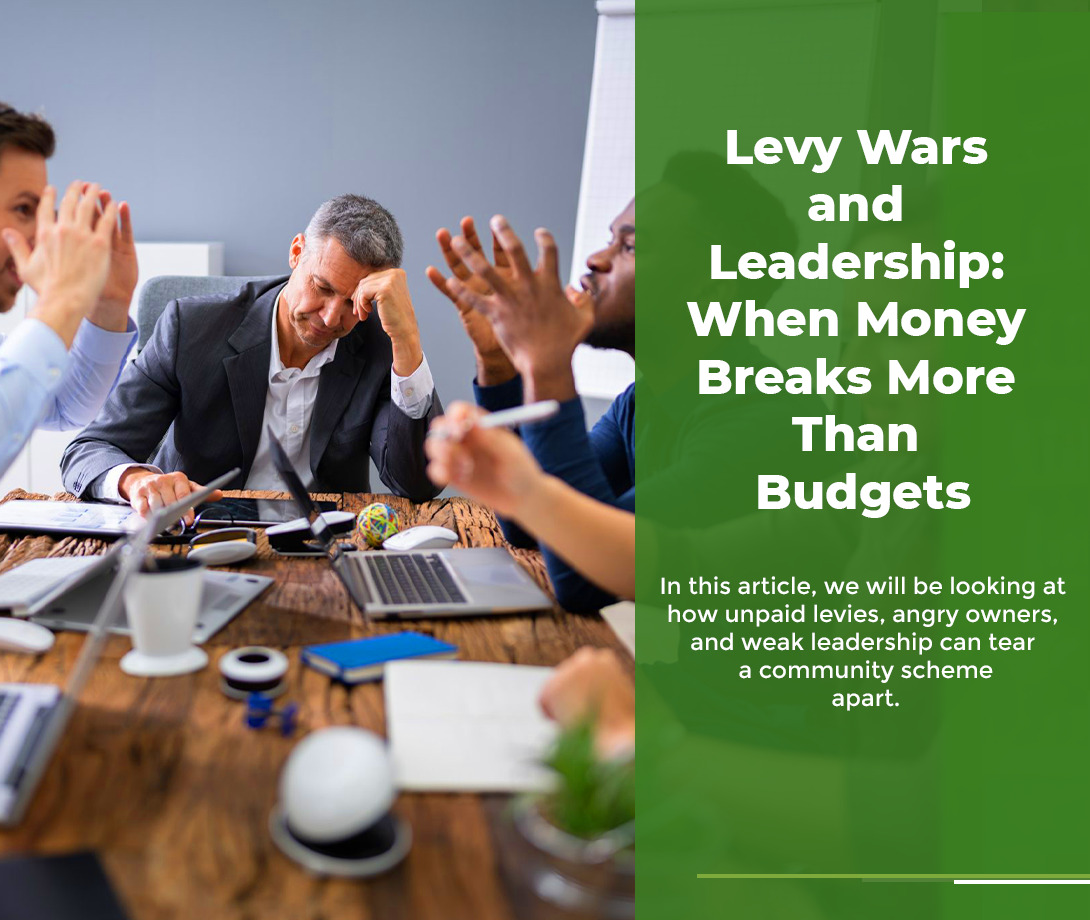How unpaid levies, angry owners, and weak leadership can tear a community scheme apart.
By CSOS Digest Editorial Team
(Estimated read time: 6–7 minutes)
When Numbers Became Weapons
In a quiet estate outside Durban, something strange happened.
The trouble didn’t start with stolen money or a big scandal.
It began with a simple question:
“Where did last year’s levies go?”
Mrs. Jacobs, who loved her home at Ridgeview Estate, refused to pay her new levy increase. She said the trustees never explained how they used old levy money.
Soon, other owners joined her. Six of them stopped paying, saying:
“We won’t give money to people we don’t trust.”
The trustees were shocked. They sent a warning:
“If you don’t pay, we’ll take legal action.”
But the problem wasn’t only money anymore. Trust had cracked.
Emails turned icy. Meetings became shouting matches.
The estate was no longer a community — it was a battlefield.
And just like many other schemes, Ridgeview fell into a cycle:
Mistrust → Non-payment → Legal fights → No leadership.
The Case: Cash, Conduct, and Credibility
Case Reference: CSOS/KZN/1024/25 (fictional, based on real patterns)
The Complaint
Owners said trustees:
- didn’t give audited financial statements
- spent money without clear approval
- increased levies without proper voting
The Defence
Trustees said costs were rising and repairs were urgent. They accused owners of using non-payment as a weapon.
The Ruling
The CSOS Ombud ruled partly in favour of owners and ordered:
- Audited statements must be produced in 60 days.
- Budgets must be approved at legal AGMs.
- Levy increases above 10% must be clearly explained and justified.
- Owners must continue paying levies — even during disputes.
The adjudicator’s message was clear:
“Transparency is not optional — it is the price of leadership.”
The Human Side: When Trust Drains Faster Than Money
Levy wars are never really about money.
They are about trust.
Owners ask:
“If I pay, will it be used fairly?”
Trustees ask:
“If we work hard, will owners support us?”
When both sides stop believing in each other, everything collapses:
- Budgets fail
- Maintenance stops
- Reserves run dry
- Angry voices take over
One owner at the CSOS hearing said it perfectly:
“We stopped paying because we stopped believing.”
The 5 Stages of a Levy War
| Stage | What Happens | Signs |
| 1️.Silent Frustration | Owners lose confidence | Missing AGMs, late payments |
| 2️.Open Rebellion | Owners withhold levies | WhatsApp fights, rumours |
| 3️.Breakdown | Trustees lose control | No audits, rising arrears |
| 4️.CSOS Steps In | Case filed | Burnout, legal stress |
| 5️.Rebuilding (If Lucky) | New trust is built | Clear budgets, calm meetings |
Lessons from the CSOS Decision
| Lesson | Meaning |
| 1️.Non-payment Is Not Protest | You cannot fight trustees by withholding levies. Pay first, dispute properly. |
| 2️.Transparency Stops Revolt | Share budgets, audits, and monthly reports before tensions grow. |
| 3️.Trustees Are Guardians | Levi money is not “theirs.” It is held in trust. |
| 4️.Communication Is Currency | Clear facts save more money than court papers ever could. |
The Cost of Conflict
| Metric | Insight |
| R2.3 million | Average levy arrears in medium-sized schemes |
| 40% | Of CSOS cases involve levies and finances |
| 28% | Of trustee resignations linked to burnout and owner hostility |
| R50,000+ | Average cost of levy litigation — often unrecoverable |
As one managing agent put it:
“It’s not unpaid money that kills a scheme — it’s unpaid attention.”
What This Means for You
Trustees
- Share financial summaries every quarter
- Do external audits annually, even if not required
- Lead with clarity, not scolding
Owners
- You must pay levies — even if unhappy
- Ask questions through proper channels
- Show up at AGMs and participate before a crises
Managing Agents
- Make financial reports clear and simple
- Offer dashboards where owners can see real-time spending
- Teach trustees financial literacy and ethics
Leadership Beyond the Ledger
Money doesn’t just maintain buildings.
It maintains trust.
A balance sheet isn’t just numbers. It is a promise between neighbours.
When leadership becomes secretive, even honest budgets look suspicious.
CSOS rulings show one truth again and again:
Leadership is not about power — it is about accountable empathy.
In community living, leadership isn’t a position.
It’s a promise to protect what we share.
CSOS Digest Takeaway
| Principle | Description |
| Transparency | Share audits and budgets openly and early |
| Governance | Trustees must act legally and responsibly |
| Empathy | Understand levy fatigue without abandoning duty |
| Dialogue | Rebuild trust before arrears, not after |
About CSOSlive Digest
CSOSlive Digest shares the human stories behind how South Africa’s community schemes work — and sometimes fail. We help trustees, owners, and managing agents build communities where money, rules, and people all serve fairness and harmony.
For more information you can visit https://csos.org.za and https://www.csosconnect.org.za


